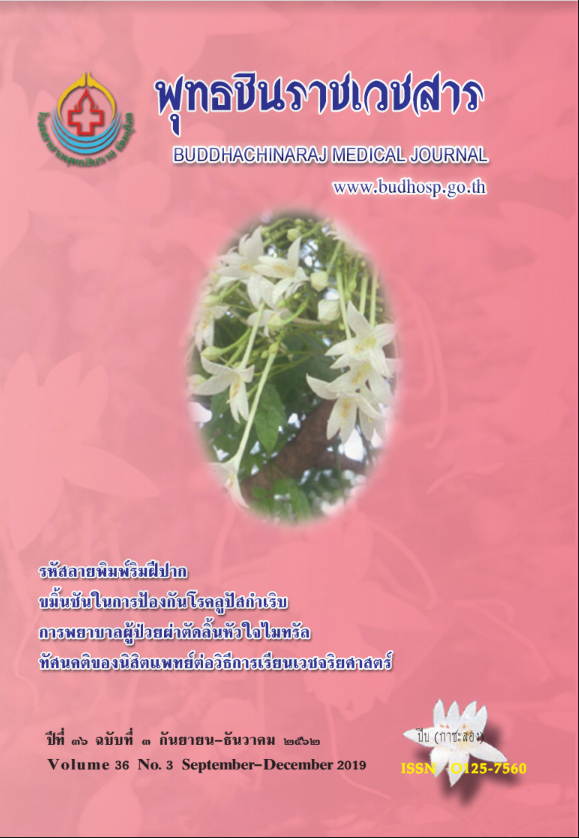ปลูกถ่ายไต: "อวัยวะที่ไม่สูญเสีย" ด้วยการมีส่วนร่วมของชุมชน
ปลูกถ่ายไต
คำสำคัญ:
การปลูกถ่ายไต, อวัยวะที่สูญเสีย, การมีส่วนร่วมของชุมชนบทคัดย่อ
การปลูกถ่ายไตเป็นวิธีรักษาผู้ป่วยไตวายเรื้อรังระยะสุดท้ายที่ดีที่สุด ปัจจุบันมีผู้ป่วยไตวายเรื้อรังระยะ
สุดท้ายจำนวนมากที่รอการปลูกถ่ายไตจากผู้บริจาค ซึ่งบางรายต้องรอนานถึง 22 ปี การปลูกถ่ายไตนั้นเป็นเสมือน
"ชีวิตใหม่" ของผู้ป่วยไตวายเรื้อรังระยะสุดท้าย ทว่าการผ่าตัดปลูกถ่ายไตที่สิ้นสุดกระบวนการในโรงพยาบาลนั้น
เป็นเพียงจุดเริ่มต้น ส่วนที่สำคัญที่สุดหลังจากนั้นคือการกลับไปใช้ชีวิตในชุมชนและดูแลตนเองอย่างเคร่งครัด อาทิ
การกินยากดภูมิคุ้มกันตลอดชีวิตเพราะถ้าผู้ป่วยขาดยาหรือกินยาไม่สม่ำเสมอร่างกายจะปฏิเสธไตใหม่จนทำให้
เกิดภาวะไตวายอีก หรือเรียกว่า "อวัยวะที่สูญเสีย" ซึ่งการจะส่งเสริมให้ผู้ป่วยปฏิบัติตนได้ถูกต้องนั้นต้องอาศัย
การมีส่วนร่วมทั้งตัวผู้ป่วยเอง ผู้ดูแล ผู้ให้บริการ และชุมชน ดังนั้นการมีส่วนร่วมของชุมชนจึงสำคัญอย่างยิ่งที่จะ
ทำให้ไตที่ปลูกถ่ายไม่เป็นอวัยวะที่สูญเสีย บทความนี้ได้นำเสนอข้อคิด/ความคิดเห็นในประเด็นการมีส่วนร่วมของ
ชุมชนในการดูแลป่วยปลูกถ่ายไต ประกอบด้วยสถานการณ์การปลูกถ่ายไต ความหมาย ชนิด ระดับ ความสำคัญ
และข้อเสนอแนะเกี่ยวกับการมีส่วนร่วมของชุมชนเพื่อพัฒนาการดูแลผู้ป่วยไตวายเรื้อรังระยะสุดท้ายที่ได้รับการ
ปลูกถ่ายไตไม่ให้ไตเป็นอวัยวะที่สูญเสีย ผู้ป่วยมีสุขภาพที่ดีและคุณภาพชีวิตที่ดีต่อไป
เอกสารอ้างอิง
2. Ministry of Public Health. Health Data Center: HDC [internet]. 2018 [cited 2018 May 20]. Available from:https://hdcservice. moph. go.th/ hdc/main/index_pk.php
3. Garcia-GarciaG, Harden P, Chapman J. The global role of kidney transplantation. Indian J Nephrol 2012;22(2):77-82.
4. International Society of Nephrology. Collaborating for safer kidney transplants globally [internet]. 2016 [cited 2018 May 16]. Available from:https://www.theisn.org/images/ISN_News_57_Site.pdf
5. Organdonate Thailand. Annual report. [internet]. 2017 [cited 2018 May 16]. Available from:http://www.organdonate. in.th/Download/pdf/odc2560.pdf 6. World Health Organization. Community participation in local health and sustainable development approach and techniques. [internet]. 2002 [cite 2019 Jan 14]. Available from:http://www.euro.who.int/__data/assets/pdf_file/0013/101065/E78652.pdf
7. Gaventa J, Barrett G. Mapping the outcomes of citizen engagement. World Dev 2012;40 (12):2399-410.
8. Cragg L, Davies M, Mcdowall W. Health promotion theory [internet]. [n.d.] [update 2013; cite 2019 Jan 14]. Available from: https://derby.rl.talis.com/items/CC36A6D2-5363-3354-4C21-31B3867336E7.html
9. Devas N, Grant U. Local government decision making citizen participation and local accountability: some evidence from Kenya and Uganda. Wiley Intersci 2003;23(4):307-16.
10. Ndekha A, Hansen EH, Malgaard P, WoelkG, Furu P. Community participation as an interactive learning process:experiences from a schistosomiasis control project in Zimbabwe. Acta Trop 2003;85(3):325-38.
11. Marston C, Hinton R, Kean S, Baral S, Ahuja A, Costello A, et al. Community participation for transformative action on womens, childrens and adolescents health. Bull World Health Organ 2016;94:376-82.
12. Norwegian Agency for Development Cooperation (Norad). A framework for analyzing participation in development [internet]. 2013 [cite 2018 Jan 14]. Available from:https://www.oecd.org/derec/norway/ NORWAY_A_FrameworkforAnalysing Participation Development.pdf
13. Cornwell A. Unpacking 'Participation':models, meanings and practices. Community Dev J 2013;43(3):269-83.
14. Macinko J, Harris MJ. Brazil's family health strategy-delivering community- based primary care in a universal health system. New Eng J Med 2015;372(23):2177-81.
15. King KF, Schagel RH, Trask EV, Zhang J, Garland AF. Caregiver participation in community-based mental health service for children receiving outpatient care. JBHS & R 2013;40(2):180-90.
16. Ladin K, Emersos Z, Butt E, Gordon D, Lavelle T. How important is social support in determining patients' suitability for transplantation? Results from a National Survey of Transplant Clinicians [internet]. 2017 [cite 2018 Jan 14]. Available from: https://jme.bmj.com/content/44/10/666.long
17. Ndemera H, Bhengu B. Motivations and barriers to self-management among kidney transplant recipients in selected state hospitals in South Africa: A qualitative study. Health Sci 2017;11(5):1-13.






